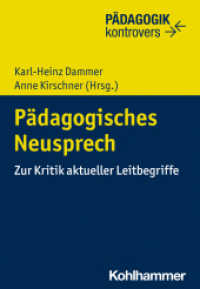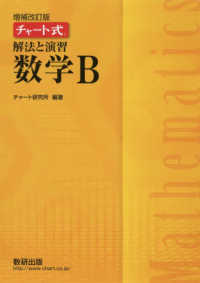- ホーム
- > 洋書
- > 英文書
- > Politics / International Relations
Full Description
In the blink of an eye, liberal democracy's moment of triumph was darkened by new threats, challenges, and doubts. Rejecting the view that liberal democracy's twentieth-century victory was inevitable, distinguished student of war Azar Gat argues that it largely rested on contingent factors and was more doubtful than has been assumed. The world's liberal democracies, with the United States at the forefront, face new and baffling security threats, with the return of capitalist nondemocratic great powers—China and Russia—and the continued threat of unconventional terror.
The democratic peace, or near absence of war among themselves, is a unique feature of liberal democracies' foreign policy behavior. Arguing that this is merely one manifestation of much more sweeping and less recognized pacifist tendencies typical of liberal democracies, Gat offers a panoramic view of their distinctive way in conflict and war. His book provides a politically and strategically vital understanding of the peculiar strengths and vulnerabilities that liberal democracy brings to the formidable challenges ahead.
Published in cooperation with the Hoover Institution
Contents
Chapter 1 Preface
Chapter 2 Chapter 1: Why Democracy Won in the Twentieth Century
Chapter 3 Chapter 2: The Ascent of Capitalist Parliamentarianism
Chapter 4 Chapter 3: Free Trade or Imperialism?
Chapter 5 Chapter 4: The Return of the Nondemocratic Great Powers
Chapter 6 Chapter 5: The Modern Transformation and the Democratic Peace
Chapter 7 Chapter 6: The Democracies' Way in Conflict
Chapter 8 Chapter 7: Why Counterinsurgency Fails (with Gil Merom)
Chapter 9 Chapter 8: Did Democracies Exterminate the Natives of North America and Australia?
Chapter 10 Chapter 9: Unconventional Terror and the New World Disorder
Chapter 11 Chapter 10: Conclusion: Strength and Vulnerablities
Chapter 12 List of Liberal Democracies' Unique Behavioral Traits in Conflict
Chapter 13 Notes
Chapter 14 Index








